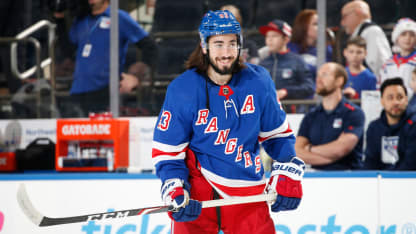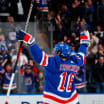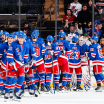An injury kept Artemi Panarin from playing in the NHL All-Star Game in St. Louis this past weekend. There is a strong argument to be made that an injury kept Mika Zibanejad out of the All-Star Game, too.
With the midseason break in the rearview and the Rangers' second half of the season set to begin on Friday night at Madison Square Garden, all that is ancient history now, and anyway, was never high on Zibanejad's list of priorities to begin with. But the injury Zibanejad suffered on a hit from Boston's Patrice Bergeron during the first period against the Bruins on Oct. 27 helped shape the contours of this season's first half for a player who was coming off a career year, began that month with a dazzling eight points in his first two games of 2019-20, then ended the month on the injured list, where he would remain until the eve of Thanksgiving.
And for the rest of us, does anybody doubt that if not for that one shift in late October, the Rangers' No. 1 center had put together an All-Star caliber first half? Consider these numbers, at least: Despite missing the full month, 13 games in all, Zibanejad will emerge from the break in 10th place in the NHL in goals per game (0.51), and 18th in points per game (1.11).
That last number is higher than any forward selected to the All-Star team out of the Metropolitan Division, save for one: his teammate, Artemi Panarin. And Zibanejad takes on more ice time than any player in his division, by a wide margin.
With the Rangers ready to return to business with a home-and-home set against the Red Wings on Friday and Saturday, Zibanejad sat down with NYRangers.com during the break to take a look back on his injury-encumbered first half, Panarin's influence on him and on the Rangers, and to look ahead to what will be a busy second half for his Blueshirts:
1-on-1 With Mika Zibanejad: 'You Can See the Progress'
Rangers' Top Center Discusses Team's Growth, Panarin's Addition & Season's Second Half

© Jared Silber/Getty Images
On how his injury affected his first half, including his All-Star case:
MIKA ZIBANEJAD: "It's nothing you think about during the season, or at least I don't think of it in those terms. Sure, I would probably say I would have a better chance (without the injury), but there's nothing I can do about it, and it's nothing I'm worried about. I'm not worried about the 13 games I missed for the All-Star, I'm worried about the 13-game stretch where I missed all those games with the team. And just for my own personal sake as well, to lose that rhythm, 13 games kind of takes a little bit to get back."
If it did take some time to get back up to speed, he had a lot of people fooled. Zibanejad rejoined the lineup on Nov. 27 at the Garden against Carolina, and scored on his second shift of the game, just 2:54 into his return. David Quinn eased him back in with 17:25 of ice time that night; 36 hours later in Boston, he played more than 24 minutes.
As he did last season, Zibanejad leads the Rangers' forwards in average ice time this year, at 21:24 per game -- fifth-highest among NHL forwards -- and since returning from his injury he has played 26 games, with 14 goals and 14 assists. The 26-year-old has dealt with injuries before -- a fractured leg cost him two months of 2016-17, his first season in a Blueshirt. But he feels that when injury struck this time, all the work he has put in to prepare for recent seasons paid off in a new way:
MZ:"I can honestly say I think I put myself in a good spot. Going back to the summers I've been having the last couple of years, there was a lot of work but it helped me a lot. (During this season's injury) there was a lot of good patience from the training staff and everyone around to kind of just make sure that I'm 100 percent, not just to get back but to be able to skate and work out and get that conditioning right back again -- even though I didn't feel like I lost much, because I was on the ice quite a bit. During that time, I think it was just the couple games right before (the injury) where I was kind of feeling settled in and everything, so when I did get back I was 100 percent and I felt conditioning-wise it was fine coming back. And obviously all the help we get from training staff and the coaches and the skills coach and everyone that's been working with me, that's a big part of it."
On how the Rangers have grown as a team from the beginning of the season up to the break:
MZ: "You can see the progress, you can see the steps we're taking, but at the same time I don't think anyone's happy where we are right now. So in that sense, we still have a few things we have to get better at. …
"I think we have a pretty good team here, and the way we play is maybe not so fancy all the time, but we get our opportunities and we have skilled enough guys in this room that can make plays when we need to, when opportunity is given. But I think it's just continuous work, and the little things -- that we don't put ourselves in a bad spot with turnovers or bad plays that lead into D-zone play for longer periods of time. And it's just winning the key battles, the little battles that we have, all the small battles we have.
"I know someone from the outside may be thinking it's not a big deal. But when it adds up at the end it's a really, really big deal; it can make the difference in games. And the good thing is, I really think everyone has been buying into that.
"Again, you can't have four, five, seven guys -- you have to have everyone buying in. … That's a big part of it and that's a big part of the learning process and maturing in our game."
On the importance of a young and developing team playing high-pressure games down the stretch of this season, and of doing "all the little things":
MZ: "I think it is really important if we want to create the type of winning culture we're trying to create here. You can learn a lot about a loss but I think you learn more about a win, and a tight (high-pressure) game like that -- you start to understand what it takes to win those tight games, the playoff type of games.
"That's just the simple fact of it: If you're 21 or if you're 31, it doesn't really matter -- it's buying in, it's doing the little things, and we've got to find a way to do it. We've got to be able to have expectations and demands on ourselves, and be able to demand something from your teammate. We have to create that winning culture, and that's: If we want to be a successful team, especially with the young guys we have, we've got to find ways to win and we've got to understand exactly what we're doing when we win -- understand all the little things that we're doing right."
On the addition of Panarin and how it has changed things for the Rangers and for him:
MZ: "Obviously it's changed a lot, but then again my role doesn't change that much. It's maybe harder for (opponents) to match up what line they're going to go after. And it's obviously so impressive how he does it. He's been such a focus for the opponent, and obviously with him and Stromer having that chemistry and adding Quickie to that, with what he brings to the line, it's a hard line to stop.
"I've been impressed all season with him, and when they started playing together it was even more of that. It's always nice when you have that. Whether you're first line, second line, third line, fourth line, whatever, it matters to have more threats. You don't become one-dimensional in that way, and teams are obviously aware when he's on the ice and trying to do the most to stop him and stop that line as a whole. And that's always a really good feeling to have in your locker room."
Zibanejad, who was by a wide margin the Rangers' leading scorer a season ago, was asked if the addition of Panarin has caused him to approach his own role differently in any way, or to utilize his strengths over all 200 feet of the ice and feel any less of a burden to push for offense:
MZ:"I don't really think about it -- that maybe crept in a few games last year, but … I don't see it as a burden that way. Even with him, I think I've still got to be able to produce in the role I've been given. Obviously there's a few nights when you have a really tough matchup, guys that can really score and can create offense, but I also know that from a defensive standpoint, that if you do a good job in that you're going to be able to get your chances offensively.
"And I mean, last year was fun in that way. It was fun to have that role and to kind of put a little bit of that pressure on yourself as well, to wanting to produce and being extra hungry to really take advantage of the chances that you're getting. I didn't see it as a burden then, and obviously now, you still want to help the team because you get a lot of ice time playing on the first line and you want to score. You want to create chances, you want to create scoring chances for your linemates and teammates, so that doesn't change.
"So I don't see a burden, I just see an opportunity and a challenge. And I like a challenge. I'm up for it."


















